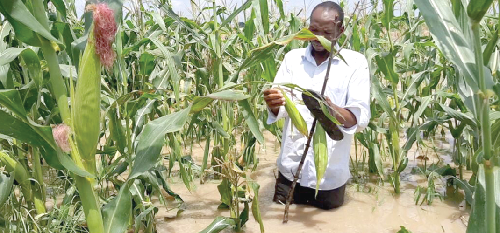Food security according to the UN’s Committee on World Food Security means that all people, at all times, have physical, social, and economic access to sufficient, safe, and nutritious food that meets their food preferences and dietary needs for an active and healthy life. The major threats to food security are Climate change, Population growth, rising food prices, and Post-harvest losses. About 805 million people are not food secured and the majority of these are in developing countries, whereas Ghana belongs.
Ghana has not been food secured, but the situation will be more serious in the last quarter of 2020. This is as a result of the precarious situation of rain falls in the country as it happened in 1983/84.
Moving through the length and breadth of the southern sector of the country; Bono East, Ashanti, Eastern, Volta, Greater Accra, Central, Western, and Western North Regions, for the past two months gives a clearer view of the intensity of the situation of inadequate rainfall.
Initially, thought was that rainfall was limited to the Bono East region, but having the opportunity to visit some of the farmers (as an agronomist) in the other regions mentioned above, shows that the situation is widespread.
The main staples foods such as maize, cowpea, cassava, plantain, groundnut, and even rice (upland and valley bottom varieties), are all affected. The food production situation was negatively affected when in early August when the Bagri dam in Burkina Faso was spilled causing floods to farmlands in some parts of the Upper East and Northern regions.
All these while, farmers though it is the normal break in the rain which is usually observed in areas that experience the bimodal rainfall distribution pattern, everybody was preparing seriously for the commencement of the minor season rains latest by the third week of August, but to no avail.
August ended and the attention shifted to the first week of September. We are in the second week of September and there are no indications of the rainfall coming in the earliest possible time. There is no encouraging forecast from the Meteorological Service either. Night temperatures remain low; as observed in the early parts of the harmattan period.
Even now, if the rains come, some parts of the country may not be able to produce in the minor season. This is because, in such places, the minor season is very short and ends in October-November. A little delay in the commencement of the rains will mean the whole country may not produce in the minor season.
Should it happen, can our current food stocks sustain us till the end of the harvest to the next major season? Could we have enough maize to enjoy our tuo-zafi, akple, or kenkey? Could we have enough cassava to get our fufu and kokonte? Plantain for fufu and ampesie? What about cocoyam, banana, and vegetables?
THE WAY FORWARD.
In the short term, importation is the solution. But the question is, can we get enough of all the staples?
In the long term, *IRRIGATION* is the way forward.
The government should make conscious efforts to utilize the Volta Lake to its full potential. Along the Volta Lake, on both sides, we can replicate the irrigation scheme at the Akuse-Asutuare area (Kpong Irrigation Scheme), to make water available all year round.
Existing irrigation projects located at Dawhenya, Kpando, etc should be rehabilitated.
The government’s policy ‘one village one dam’ should be proactive and results-oriented to assist the farmers in irrigation across the villages.
Other places and mountainous areas can drill boreholes for the purpose of irrigation.
1983/84 is here with us. If measures are not put in place now, for instance, investing in irrigation, breeding shorter season varieties, using varieties with better water use efficiency, building storage facilities to store our excess produce in seasons with good yield, minimizing post-harvest losses, then the next time the situation repeats itself, the effects will be more devastating.
Written by: Emmanuel Ankugah
Agricultural Economist and Agronomist








